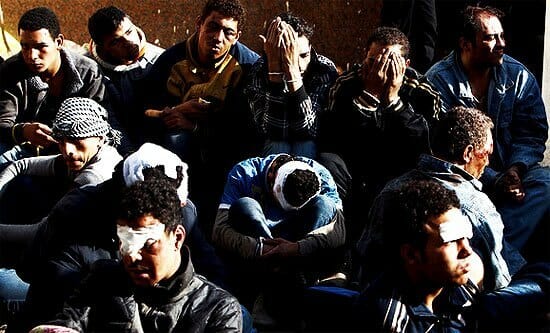As the new Egyptian regime run by the Muslim Brotherhood is attempting an aggressive power grab and launching street violence on revolutionaries and opposition groups across the country, a coalition of Egyptian and European organisations are questioning European public banks’ political and financial backing of a constitutional coup and crackdown.
In an open letter to the European Investment Bank and the European Bank for Reconstruction & Development, they express their concern about the current political situation. “President Morsi’s undemocratic power grab and the resultant violence run counter to the transition to democracy to which both banks and the European Union are committed”, says Mohamed Mossallem of the Egyptian Initiative for Personal Rights.
Letter to the EBRD Letter to the EIB
 On November 22nd, President Morsi awarded himself far-ranging new powers, widely criticised domestically and internationally as a power-grab and “constitutional coup”. Morsi’s decision led to hundreds of thousands of Egyptians protesting across the country and caused street-battles with state security and Muslim Brotherhood supporters in which at least ten people died.
On November 22nd, President Morsi awarded himself far-ranging new powers, widely criticised domestically and internationally as a power-grab and “constitutional coup”. Morsi’s decision led to hundreds of thousands of Egyptians protesting across the country and caused street-battles with state security and Muslim Brotherhood supporters in which at least ten people died.
Most disturbingly, widespread reports documented armed Muslim Brotherhood militias and ‘torture chambers’ in which hundreds of protestors were detained, assaulted and coerced into making ‘confessions’—‘confessions’ which Morsi then cited on television.
“Morsi’s increasing control over the state and his violent tactics to suppress the opposition invoke painful memories of Mubarak’s autocratic ruling. The coinciding financial support of international financial institutions serves as a stamp of approval for Morsi’s moves and has enabled a further power grab”, says Philip Rizk of the Popular Campaign to Drop Egypt’s Debt.
The President is aggressively pushing through the Constitution. A process that should be centred around consensus and inclusion has been marred by a Constituent Assembly that ignored all minority, secular and independent voices, widespread voter fraud and intimidation during the referendum, and re-empowerment of the military to arrest civilians under a military code of justice.
“

Martial law and democracy are not compatible, we want European public banks to understand this and act accordingly. The EU’s close relations with and financial support to Mubarak and other authoritarian regimes were a strategic mistake. If the EU is serious about its renewed neighbourhood policy and supporting “deep democracy,” it must avoid repeating its old mistakes and order its banks to step back from supporting this turn to autocracy”, says Mika Minio-Paluello of Platform.
“European development money cannot be seen to be supporting a new Mubarak. A moratorium on lending to Egypt is the only viable solution to comply with EU objectives and allow democratic change to still unfold in the region”, the letters conclude.
The letters are signed by the Egyptian Initiative for Personal Rights, the Egyptian Center for Economic & Social Rights, the Popular Campaign to Drop Egypt’s Debt, Re:Common (Italy), Platform (England), Counter Balance (Belgium) and CEE Bankwatch Network (Central & Eastern Europe)